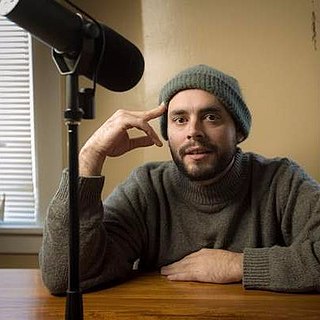
Sutro Tower is a unique three-legged 297.8 m (977 ft) tall TV and radio lattice tower located in San Francisco, California. Rising from a hill between Twin Peaks and Mount Sutro near Clarendon Heights, it is a prominent feature of the city skyline and a landmark for city residents and visitors. The tower was the tallest structure in San Francisco from the time of its completion in 1973 until it was surpassed by the Salesforce Tower in 2018.
KQED is a PBS member television station licensed to San Francisco, California, United States, serving the San Francisco Bay Area. The station is owned by KQED Inc., alongside fellow PBS station KQEH and NPR member KQED-FM (88.5). The three stations share studios on Mariposa Street in San Francisco's Mission District and transmitter facilities at Sutro Tower.
KQED-FM is a listener-supported, non-commercial public radio station in San Francisco, California. It is simulcast on KQEI-FM in the Sacramento metropolitan area. The parent organization is KQED Inc., which also owns two PBS member television stations: KQED and KQEH. Studios are on Mariposa Street in the Mission District of San Francisco.

KALW (91.7 MHz) is an educational FM public radio station, licensed to the San Francisco Unified School District (SFUSD), which serves the San Francisco Bay Area. Its studios are located at Phillip and Sala Burton Academic High School off Mansell Avenue in San Francisco, and its transmitter tower is on Twin Peaks.
KERA is a non-commercial, listener-supported public radio station in Dallas, Texas. It is a member of National Public Radio (NPR). KERA 90.1 FM, KKXT 91.7 FM and KERA-TV 13, a PBS affiliate, are owned by North Texas Public Broadcasting, with studios on Harry Hines Boulevard in Dallas.
KQEH, branded on-air as KQED Plus, is a PBS member television station licensed to San Jose, California, United States, serving the San Francisco Bay Area. The station is owned by KQED Inc., alongside fellow PBS station KQED and NPR member KQED-FM (88.5) in San Francisco. The three stations share studios on Mariposa Street in San Francisco's Mission District and transmitter facilities atop Sutro Tower; until January 17, 2018, KQEH's transmitter was located atop Monument Peak.

Michael Jay Krasny is a professor and retired American radio host of Forum, a news and public affairs program on San Francisco public radio station KQED-FM, covering current events, politics, and culture from 1993 to 2021. Additionally, Krasny is currently a professor of English literature at San Francisco State University.
KPJK is a non-commercial independent television station licensed to San Mateo, California, United States, serving the San Francisco Bay Area. Owned by Northern California Public Media, it is sister to PBS member station KRCB and NPR member stations KRCB-FM (104.9) and KRCG-FM (91.1). KPJK's studios are located on West Hillsdale Boulevard on the campus of the College of San Mateo in southwestern San Mateo, and its transmitter is located atop Sutro Tower in San Francisco.
KMTP-TV is an independent non-commercial educational television station licensed to San Francisco, California, United States, serving the San Francisco Bay Area. Owned by the Minority Television Project, the station maintains studios on Woodside Way in San Mateo. Its transmitter, shared with KCNS, KTNC-TV and KEMO-TV, is located atop Sutro Tower in San Francisco.

KRCB is a PBS member television station licensed to Cotati, California, United States, serving the San Francisco Bay Area. Owned by Northern California Public Media, it is a sister station to NPR members KRCG-FM (91.1) and KRCB-FM (104.9) and independent noncommercial station KPJK. The stations share studios on Labath Avenue in Rohnert Park; the TV station's transmitter is located at Sutro Tower in San Francisco.
KEAR (610 kHz), is a non-commercial Christian AM radio station in San Francisco, California and is the flagship station of the Family Radio network. KEAR's transmitter facilities are diplexed at the KVTO tower located in Berkeley, California. Until 2005, KEAR was broadcasting on 106.9 MHz FM. The station's format contains Christian music as well as Calvinist religious teaching.
WMUM-FM is the Georgia Public Broadcasting (GPB) Public radio station serving Macon and central Georgia. The station shares a tower with its sister GPB Public Broadcasting Service (PBS) member television station, WMUM-TV, in Cochran, its city of license.
Madeleine Brand is an American broadcast journalist and radio personality. Brand is the host of the news and culture show Press Play, on KCRW-FM (89.9), one of Los Angeles' two National Public Radio (NPR) affiliates. The show made its debut in January 2014. Brand broadcasts from the basement of the cafeteria of Santa Monica College.
KPBS-FM is a non-commercial, listener-supported, public radio station in San Diego, California. It is owned by San Diego State University (SDSU) as part of KPBS Public Media, and is a sister station to PBS member KPBS-TV. The two outlets share studios at The Conrad Prebys Media Complex in Copley Center on Campanile Drive, part of the SDSU campus.
KUOP is an NPR-member radio station, licensed to Stockton, California, United States. The station is currently owned by California State University, Sacramento and is part of the news network of CapRadio.
Conspiracy of Beards, based in San Francisco, California, is a 30+/- member a cappella male choir performing exclusively the songs of Leonard Cohen. Inspired by late artist Peter Kadyk and directed by Daryl Henline, the group performs gritty, original arrangements of Cohen's songs.

John Sepulvado is a former U.S. public radio journalist and is former host of the California Morning Report on KQED.
K31OL-D is a low-power television station on virtual channel 38 licensed to Salinas, California, United States. It is owned by the Monterey County Office of Education. The main subchannel, MCAET TV, broadcasts programs of local interest and productions from the Media Center for Art, Education and Technology.







